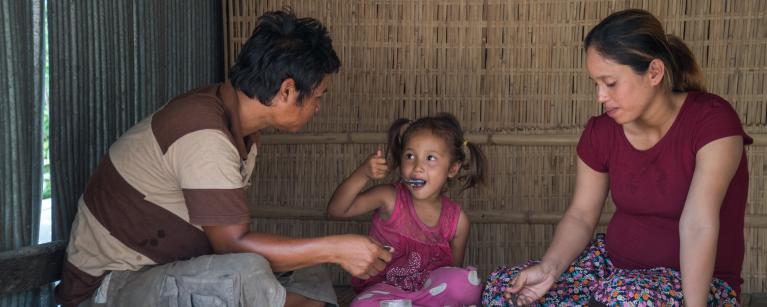Phnom Penh, Cambodia – If you are researching Unpaid Care and Domestic Work (UCDW) in Cambodia, you will likely come across these numbers: women spend 188 minutes on unpaid care work, while men spend 18 minutes. These statistics, sourced from the Ministry of Planning (MoP), have been widely used by organizations like the International Labor Organization, the United Nations in Cambodia, and Oxfam to highlight the disproportionate responsibility women and girls bear in UCDW.
However, it is important to note that these statistics date back to 2004 and do not reflect current realities anymore. The National Institute of Statistics (NIS), the official data and statistics center of the MoP, included a time use module in the 2003-2004 Cambodian Socio-Economic Survey (CSES) only. While the CSES is a well-established national instrument with multiple iterations, the lack of specific care-focused and time use data limits its relevance for care economy policies.
Baseline assessments and anecdotal evidence from Oxfam’s projects in Cambodia suggest that the distribution of care and household responsibilities has undergone notable changes in the past two decades. More men are recognizing the value of unpaid care and domestic work and sharing the workload with women.
In the last three years, the global COVID-19 pandemic brought attention to the heavy responsibility placed on women and less privileged individuals in providing essential care for their families and communities. In July 2023, in the Regional Forum on Care Work in ASEAN Countries, jointly organized by UN ESCAP, the ASEAN Committee on Women, Oxfam and the ASEAN Secretariat, key recommendations were endorsed by government representatives to increase investment in and recognition of the care sector5.
Recognizing the necessity and potential for growth in the unpaid and paid care sector, the Ministry of Women's Affairs (MoWA) started the process to draft a roadmap for inter-ministerial collaboration and policy action. Last month, MoWA held technical meetings and a national consultation workshop involving line ministries, development partners, and international and national NGOs. The goal was to present the draft Cambodia National Framework for Policy Action on the Care Economy, which builds upon the UN ESCAP's Model Framework of Action6. This multi-stakeholder framework for action builds a momentum to develop an efficient and resilient care ecosystem in Cambodia through care infrastructures, care services, care-related social protection and employment-related care policies.
To support policy implementation, MoWA emphasized the importance of timely, comprehensive, and disaggregated data and statistics on care. Taking a whole-of-government approach, MoWA invited the MoP and NIS to explore the feasibility of conducting a time use or household care survey, with technical support from UNDP and Oxfam.
To effectively address gender norms and traditional practices that perpetuate unequal care workload on women and girls, contemporary and reliable data on time use, perceptions, and practices are crucial for developing gender-transformative and inclusive public policies.
The recent proclamation of the United Nations of the International Day of Care and Support on 29 October is a timely reminder that UCDW have as much economic value as paid work. Oxfam is playing a proactive role in supporting both government and civil society organizations to recognize UCDW in national statistics and accounts as an essential gear of economic growth and development.
